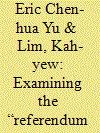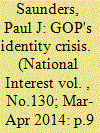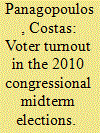| Srl | Item |
| 1 |
ID:
180697


|
|
|
|
|
| Summary/Abstract |
This paper analyzes the extent to which the performances of local and national governments can shape local election outcomes. Specifically, we use various waves of survey data from Taiwan’s Elections and Democratization Studies (TEDS) to explore whether a person’s assessments of local and central government performances affect his/her vote for the incumbent party candidate. Our empirical findings partially verify the so-called “referendum theory” and can be summarized as follows: First, voters who hold a positive assessment of the performance of local government are more likely to vote for an incumbent who seeks reelection, but this is not necessarily the case for an incumbent party candidate in an open-seat contest. Second, Taiwan’s local elections cannot be regarded as referenda on the central government because the central government approval rating does not consistently affect vote choices across different types/levels of local elections.
|
|
|
|
|
|
|
|
|
|
|
|
|
|
|
|
| 2 |
ID:
105417


|
|
|
|
|
| Publication |
2011.
|
| Summary/Abstract |
An examination of the results of the recent midterm elections indicates that the new House of Representatives will probably be the most conservative and ideologically polarized House since the end of World War II. Republicans will hold 242 seats after a net gain of 63 seats, constituting the largest Republican majority in the House of Representatives since the 80th Congress (1947-49), which also had 242 Republican members.
|
|
|
|
|
|
|
|
|
|
|
|
|
|
|
|
| 3 |
ID:
128002


|
|
|
|
|
| Publication |
2014.
|
| Summary/Abstract |
IN 1958, after the Republican Party suffered a stinging defeat in the midterm elections that compounded the 1954 loss of its briefly held control of Congress, Whittaker Chambers sent a letter to William F. Buckley Jr. Buckley, who had founded National Review three years earlier, was trying to create a conservative insurgency. Like many other conservatives, including Ronald Reagan, he revered Chambers for his searing break with Communism and his exposure of Alger Hiss as a Soviet agent, which he chronicled in his memoir Witness. Chambers had warned the youthful Buckley against consorting with the radical Right, arguing that politicians such as Senator Joseph McCarthy discredited rather than bolstered a fledgling conservative movement.
|
|
|
|
|
|
|
|
|
|
|
|
|
|
|
|
| 4 |
ID:
105423


|
|
|
|
|
| Publication |
2011.
|
| Summary/Abstract |
Against the backdrop of the 2008 presidential election, a watershed event in terms of electoral participation, many speculated that renewed interest in voting would spill over into the 2010 cycle, resulting in a meaningful uptick in voter turnout in the midterm elections overall. Turnout was expected to be especially robust among Republicans eager to regain their numbers in 2010, capitalizing on Democratic withdrawal fueled by voters' frustration with President Obama, congressional Democrats, and the struggling economy. In 2008, an electorate energized around an historic contest and unprecedented levels of voter mobilization helped to drive more citizens to the polls on Election Day than ever before (Panagopoulos and Francia 2009). An estimated 131.1 million Americans voted for president, representing 61.6% of the eligible voting population (McDonald 2009). Voter turnout among eligible voters in 2008 was 1.5 percentage points higher than in 2004, when 122.3 million voters participated in the presidential election (Bergan et al. 2005). The 2008 election thus marked the third consecutive presidential election cycle in which voter turnout increased, reversing a trend of declining participation that began in the 1960s (McDonald 2009). In fact, national turnout in recent presidential elections has rivaled modern highs in the level of electoral participation that occurred in the 1950s and 1960s.
|
|
|
|
|
|
|
|
|
|
|
|
|
|
|
|